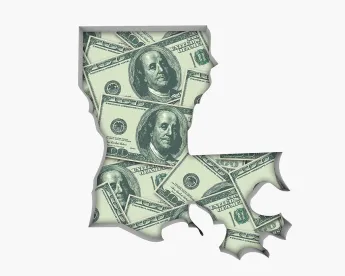Unless otherwise indicated, all bills noted below have been passed by the legislature and are waiting on signature or veto by the governor. Our discussion of each bill assumes the bill is or becomes law.
SB1 by Senator R. L. Bret Allain, II
TAX/FRANCHISE/CORPORATE: Phases-out the corporate franchise tax.
SB 1 reduces the corporate franchise tax by 25% per year provided required monies are deposited into the Revenue Stabilization Trust Fund as provided in the Louisiana constitution. Combined revenues from Louisiana corporate income and franchise taxes in excess of $600 million are required to be deposited into the Revenue Stabilization Fund. If the required deposit is made into the Revenue Stabilization Fund for a fiscal year, the 25% franchise tax rate reduction will be effective for the franchise tax period that begins on the following January 1. If the franchise tax is reduced to 0%, no franchise tax will be imposed. SB 1 also addresses the continuing utilization of tax credits with respect to repealed taxes. If combined corporate income and franchise tax projections continue as they have been trending (i.e., such collections exceed $600 million for the fiscal year that will end on June 30, 2024), the first 25% reduction likely will become effective on January 1, 2025. SB 1 becomes effective only if SB 6 also is enacted into law.
In addition to the franchise tax rate reduction provided in SB 1, La. R.S. 47:601.2, which was enacted in 2021, provides for additional franchise tax rate reductions in the event certain “triggers” are met. The rate reductions provided in SB 1 and La. R.S. 47:601.2 work in tandem, such that both rate reduction provisions could apply in the same year.
SB6 by Senator R. L. Bret Allain, II
TAX/FRANCHISE/CORPORATE: Reduces the rate of the Quality Jobs Program project facility expense rebate when certain conditions are met.
SB 6 is designed to help pay for the phase out of the franchise tax pursuant to SB 1 (discussed above) and La. R.S. 47:601.2. SB 6 reduces the sales tax and project facility rebates in the Quality Jobs program by 50% of any percentage reduction in the franchise tax rate, whether such reduction is required by SB 1 or La. R.S. 47:601.2. If the franchise tax is repealed, the rebates will be reduced by 50%. The amount of a business’s sales tax or project facility rebate for a contract or renewal is the percentage rebate in effect at the time the business files its advance notification. The reduction of the sales tax and project facility rebates due to reductions in the franchise tax rate applies only to Quality Jobs contracts with advance notifications filed after December 31, 2023. In addition, SB 6 provides that for advance notifications for incentives pursuant to the Quality Jobs program filed July 1, 2023 through December 31, 2023, related applications may be filed within 36 months of the filing of the advance notification. SB 6 becomes effective on January 1, 2024.
TAX/LOCAL: Provides relative to interest applicable to local sales and use taxes paid under protest.
SB 8 addresses local sales and use taxes that taxpayers pay under protest in accordance with the provisions of La. R.S. 47:337.63. Under current law, to the extent the tax collector prevails in the taxpayer’s protest suit, the taxpayer must pay additional interest on the protested payment to the collector at the rate applicable to tax deficiencies, not to exceed 12%. SB 8 would eliminate the onerous requirement that the taxpayer making the payment under protest must pay additional interest if the tax collector prevails. SB 8 further provides that, to the extent the taxpayer prevails in the protest suit, the tax collector must refund that tax to the taxpayer with interest at the judicial interest rate published in the state register.
TAX/INCOME/PERSONAL: Provides relative to the net capital gains deduction for individual income tax.
SB 89 provides an exclusion from individual income tax for capital gains generated by the sale of certain Louisiana businesses, provided a number of criteria are satisfied. As originally filed, this legislation would have reduced the documentation necessary to claim the exclusion on an individual income tax return. However, SB 89 was amended to give the Louisiana Department of Revenue the authority to issue binding regulations for the ostensible purpose of reducing administrative requirements, while simultaneously authorizing the issuance of other regulations limiting eligibility for the exclusion. Stay alert for proposed regulations on this topic!
HB428 by Representative Thomas Pressly
TAX/INCOME TAX: Extends to estates, trusts, and partnerships the flow-through entity income exclusion allowed to individuals.
In response to the 2017 federal Tax Cuts and Jobs Act, Louisiana implemented work-around legislation for the $10,000 federal income tax deduction limit for state and local taxes paid by individuals: the pass-through entity (PTE) election. HB 428 makes two technical modifications to the PTE election. First, PTEs which have made the election are now permitted to unilaterally revoke it for subsequent tax years; however, once revoked, a PTE will not be eligible to make the election again for five years. Second, HB 428 clarifies the tax treatment for partnerships, S-Corporations, and trusts that own interests in PTEs which make the election. Notably, the legislation does not address the tax treatment for grantors of grantor trusts that own interests in PTEs which make the election.
SB5 by Senator R. L. Bret Allain, II
TAX/AD VALOREM: Provides for alternatives in lieu of payment under protest for challenges to ad valorem tax assessments.
SB 5 removes the requirement that a taxpayer challenging the correctness of a property tax assessment pay the taxes under protest while the taxpayer’s appeal is pending before the Louisiana Tax Commission, or during any appeal if the appeal is brought by any party other than the taxpayer; i.e. the assessor. If the taxpayer appeals the Commission’s decision, the amount paid under protest, or of alternative security, shall be based on the Commission’s decision, and not the original assessment. Importantly, SB No. 5 allows a taxpayer to post security instead of paying the entire amount of the disputed taxes under protest. In addition to a bond, the statute provides for “other security” including, but not limited to, a pledge, collateral, lien, mortgage, factoring of accounts receivable, or other encumbrance of assets. To post security (as opposed to paying under protest), the taxpayer must file a rule to set security with the Board of Tax Appeals or district court within the deadline to file an appeal. With the petition, the taxpayer must provide evidence of its ability to post a bond or other security. The collector has the ability to conduct discovery about the value and validity of the proposed security. The Board or district court can decide the amount of security required to be posted. A taxpayer challenging the legality (versus the correctness) of an assessment can also use this procedure. Any undisputed amounts that are not subject to appeal must be paid to the collector.
HB256 by Representative Gregory A. Miller
TAX/SALES & USE: Requires extension of the deadline to pay local sales taxes when the deadline for payment of the tax falls on certain holidays.
HB 256 (Act 21) officially extends the deadline to pay local sales/use taxes to the next business day when the deadline falls on a state or federal holiday on which banks are closed, and prohibits the accrual or interest or penalties during the extension.
HB558 by Representative Beau Beaullieu
REVENUE DEPARTMENT: Provides for the collection and remittance of state and local sales and use taxes.
HB 558, in pertinent part, transfers the responsibility for the management, maintenance, and supervision of a single, uniform electronic local return and remittance system for sales tax remittances in La. RS 47:337.23 from the Louisiana Department of Revenue to the Uniform Local Sales Tax Board (ULSTB). As part of this new legislation, the legislature imposed additional duties on the ULSTB with regard to this system, whereby the ULSTB has a duty to manage, maintain, and supervise this system, by which taxpayers can remit “state and local” sales and use taxes through a single transaction in the system. The ULSTB has also been tasked via this new legislation to design, implement, manage, maintain, and supervise this single remittance system. The system was previously legislatively provided to the Department of Revenue; however, no funding had previously been provided. The new legislation provides a direct funding mechanism for the system. Specifically, collectors can enter into contracts directly with the ULSTB. However, under the new legislation, if a particular collector/taxing jurisdiction does not enter into a contract directly with the ULSTB, the ULSTB is now required to impose a fee based on the individual parish’s share of the states’ total population, according to the most recent federal decennial census. Funding will also be provided based on a portion of collections from the local sales and use tax imposed on motor vehicle transactions. This legislation is to be effective as of January 1, 2024. The new uniform electronic local return and remittance system is also required to be fully designed, implemented, and available for use by taxpayers no later than January 1, 2026. The goal of this new legislation is to provide a centralized filing and remittance hub for Louisiana sales taxes. The new legislation, however, does not address enforcement, audits, and other mechanisms/responsibilities of local collectors.
HB171 by Representative Beau Beaullieu
TAX/SALES & USE: Provides relative to requirements for dealers and marketplace facilitators to collect and remit sales and use taxes.
Following trends in other states, HB 171 (now Act 15) modifies Louisiana’s factor presence economic nexus thresholds under relating to “dealers” and marketplace facilitators by removing the “number of transactions” factor threshold and retaining only the dollar amount threshold. Additionally, HB 171 amends the factor presence economic nexus thresholds for marketplace facilitators such that only “retail sales” by such marketplaces will be counted for purposes of the $100,000 threshold. The legislation also provides that applications for registration of marketplace facilitators will be accepted or denied within 30 days of submission, and if accepted, the facilitator’s tax collection obligation will begin within 60 days of the triggering event leading to economic nexus being met.







 />i
/>i

